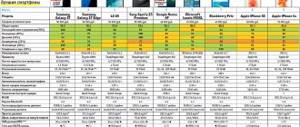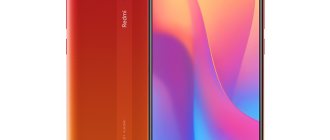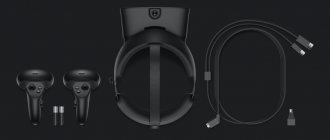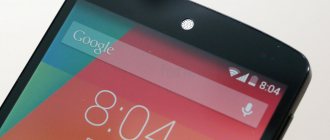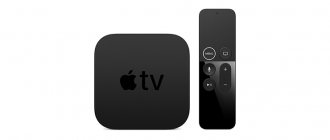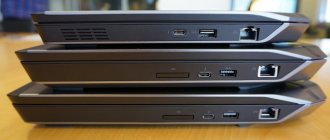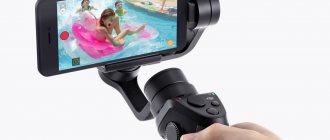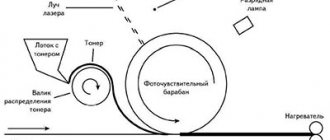Great variety
A smartphone is a cross between a mobile phone and a personal computer. Each of these devices has an operating system (OS). It could be:
- Open webOS;
- Windows Phone;
- Android;
- Apple IOS.
The type of operating system is a determining factor when considering how Android differs from a smartphone. To understand how incorrectly the question is posed, consider the types of operating systems. They influence the functions that a smartphone can support.
What is better to choose
iOS and Android are leaders among other systems and are in constant competition.
If Android synchronizes with Google, then iOS has its own cloud, that is, it does not need synchronization with any other services. Besides those who consciously love and accept Android, there are also a large number of those who have no choice. Prices for iPhones have always been significantly higher than for smartphones.
Each OS has its own nuances, but no matter what you choose - Android or iOS, you will in any case receive high-quality work from the leaders among operating systems.
Android
Let's return to the question of how Android differs from a smartphone. Android and IOS systems are the most popular all over the world. The first version of this OS was launched in 2008. Subsequently, developers only improved Android products. Now this system is installed on many digital technology products (game consoles, watches, tablets and smartphones). Android smartphones have the following advantages:
- have open source software;
- support multitasking and multi-user mode;
- widely available and relatively cheap compared to Apple products;
- surprise with its bright and user-friendly interface;
- Support Wi-Fi, file transfer via Internet, USB, Bluetooth.
The main disadvantage of mobile devices running on Android OS is their wasteful battery.
Other popular operating systems
- iOS _ The brainchild of Apple. For a device to have such firmware, you need to consider exclusively iPhones. No other phones have similar firmware; this is a unique product from Apple. Unlike Android, the system is updated frequently. Each new update greatly simplifies the work and eliminates many shortcomings. Also, sharing is very convenient, that is, up to 6 devices can be combined on one account.
- WindowsPhone . The OS appeared relatively recently on mobile devices. The main advantages of such a system are that all devices are combined into a common network. That is, using Office programs on your computer (word, powerpoint, etc.), you can save files to the cloud. Using your smartphone, you can edit and view these files and vice versa.
The best email clients for Android
Such an OS will be relevant for those who actively use Microsoft products. Otherwise, the user will not notice any special advantages for himself.
Form factor
The first smartphones looked no different from ordinary mobile phones. They had a traditional “tube” appearance with a hardware numeric keypad with 12 buttons. This state of affairs could be observed until about 2012, already in the heyday of the touchscreen era.
A modern smartphone, as a rule, has a large screen (more than 4 inches diagonally) with high resolution and almost (or completely) devoid of hardware keys. In some cases, a sliding QWERTY keyboard can be used as an addition.
At the same time, a mobile phone can be either in the form factor of a traditional dialer or with a touch screen. However, the display resolution of such devices is usually lower and the diagonal is smaller.
The touch screen with full input support is the second important difference.
Hardware platform
Smartphones are usually based on high-performance chipsets, which include multi-core processors with frequencies above 1 GHz, gigabytes of RAM and special graphics accelerators - analogues of computer video cards.
Mobile phones cannot boast of such potential; in their “hearts,” as a rule, single-core processors with a frequency of several hundred megahertz and a couple of tens of megabytes of RAM are installed.
The third difference is the powerful hardware platform.
Advantages of Android phones
The Android operating system is the most developed and optimized shell to date. Developers regularly release updates, adding new features and improving the interface in every possible way. Here are just the main advantages of Android smartphones over other phones:
- Availability of a branded application store. Almost every smartphone will have the Play Store by default. This is a special service through which it is convenient to install different programs. There are games, movies, music and office applications. Moreover, you can find both paid and completely free utilities.
- Possibility of flexible configuration. You can completely customize any Android phone to suit your needs. For example, change the wallpaper, choose a different theme, disable certain options, install a unique font, and so on. There are many different sections in the settings through which all changes are made.
- Ability to install firmware. Many modern phones come with pre-installed shells. For those who don’t know, this is a special add-on that makes using the system even more comfortable. New options and design elements are being added there.
- High level of security. The Android operating system is well protected against theft of user data. However, it is still not advisable to install applications from unknown sources. You can accidentally add a virus to your phone, which will transfer all your personal information to attackers.
Summarizing
These are the most noticeable differences between smartphones and mobile phones. Due to the reduction in the cost of production of components, the latter are gradually losing their popularity. It is possible that in the future only Androids and other smart devices will remain in stores, since the point of purchasing a low-functional cell phone will simply disappear.
At the dawn of the mobile era in Russia, phones were still divided into mobile and cellular. However, fifteen years ago these two definitions could be attributed to dialects: it is known that in St. Petersburg the name “mobile” was more often used, while the Moscow region preferred “cellular” phones. Today, both terms can be found in official documents, company catalogs, and advertising offers, and people do not differentiate between them, because there is no serious alternative to these devices that would force a more demanding approach to terminology. However, in fact, we can say that cell phones are to mobile phones as the particular is to the general. True, not every cell phone is a mobile phone, but not every mobile phone is a cell phone.
Differences in external characteristics
The purpose of this article is to distinguish the line that separates the world of smartphones and the world of mobile phones. First of all, they differ in their external characteristics.
Typically, a mobile phone is smaller than a smartphone. But microelectronics is constantly evolving, and this increasingly affects the blurring of these differences.
If you compare a mobile phone and a smartphone, which were released at the same time, then the screen size of the latter has always been larger. These means of communication differ in the number of their functions.
Recently, people have ceased to understand the difference between a smartphone and a regular mobile phone. This is due to the fact that smartphones have become the most popular product for quite some time. They are the ones that sell best now. And people began to forget about ordinary cell phones. They began to believe that they simply did not exist anymore, that smartphones had replaced mobile phones. But this is absolutely not true!
Let's start with the fact that before there were no smartphones. Just remember 1987, when Nokia released a simple phone called Mobira Cityman 900
. It was a real brick - heavy and big. And nothing better existed on the market at that moment. It's hard to believe, but phones of those years couldn't even send and receive SMS! Moreover, it took them a while to even get a contact book!
In the 90s, only desktop computers and laptops could be called smart. One could only dream of all kinds of smartphones and tablets, or observe their use in the Star Trek series - its creators literally predicted the future.
The breakthrough came only in 2001, when the Nokia 9210 Communicator
. It was one of the first smartphones. Symbian OS 6.0 was installed on it as an operating system, and the device could also please with a full-fledged QWERTY keyboard. The popularity of the model was such that in the future almost all portable devices equipped with smart functionality and a slot for a SIM card began to be called communicators. In particular, this was the name given to devices with Windows Mobile on board.
What to buy: smartphone, iPhone or phone
The main thing is to pay attention to the capabilities of the devices and decide whether you need it. For example, not everyone likes to take photos and actively communicate on social networks. There are those who do not write a message for any questions, but call. It makes no sense for such people to buy anything other than a phone, since after paying several tens of thousands, the powerful device will only be used for calls, which is not advisable.
There is no need to rely on others when choosing a means of communication, you need to think about individual capabilities
and needs. iPhones are being actively promoted now, but who uses all the capabilities of this phone? Apart from a good camera, this powerful device is capable of a lot. Most people buy it because of fashion and a powerful camera.
Smartphone Features
.
- Versatility.
- Multifunctionality. You can install programs, surf the Internet and actively work, powerful.
- Easy to use.
As a rule, it does not have complicated operating schemes and has a simple interface that anyone can understand.
The three different types of technology have their own advantages and disadvantages. The most correct decision in this matter is to consider your own needs and make a choice based on them.
Differences between iOS and Android
An equally popular question is: what is the difference between an iPhone and an Android smartphone? After all, a gadget that runs on iOS, i.e. a full-fledged operating system, can also be called a smartphone. Today, the word “iPhone” has practically become a household word, and the word “smartphone” is practically not used in relation to Apple devices.
In addition to the fact that using an iPhone is fashionable, you also need to take into account the advantages of the OS on these devices, thanks to which some users love iOS so much. Before buying an iPhone or Android smartphone, you need to understand the main differences, the main ones of which are:
Previously, another strong argument in favor of Android was the price, but today, among the latest powerful models from Samsung, Sony and HTC, you can find many devices that are only slightly cheaper than an iPhone. On the other hand, in the budget and mid-price segment, Android has firmly taken the leading position; Android phones are bought by those who care about the quality of the camera, screen, and processor speed, but who are not ready or do not consider it necessary to pay $700-1000 for telephone.
09. 06.2017
Blog of Dmitry Vassiyarov.
Hi all.
Just 10 years ago, the process of buying a mobile phone was much simpler, because many new types of gadgets have appeared on the modern market and each can have several names. How to understand them? It's easy if you read this article.
From it you will learn what a smartphone is and how it differs from a mobile phone, communicator and PDA.
